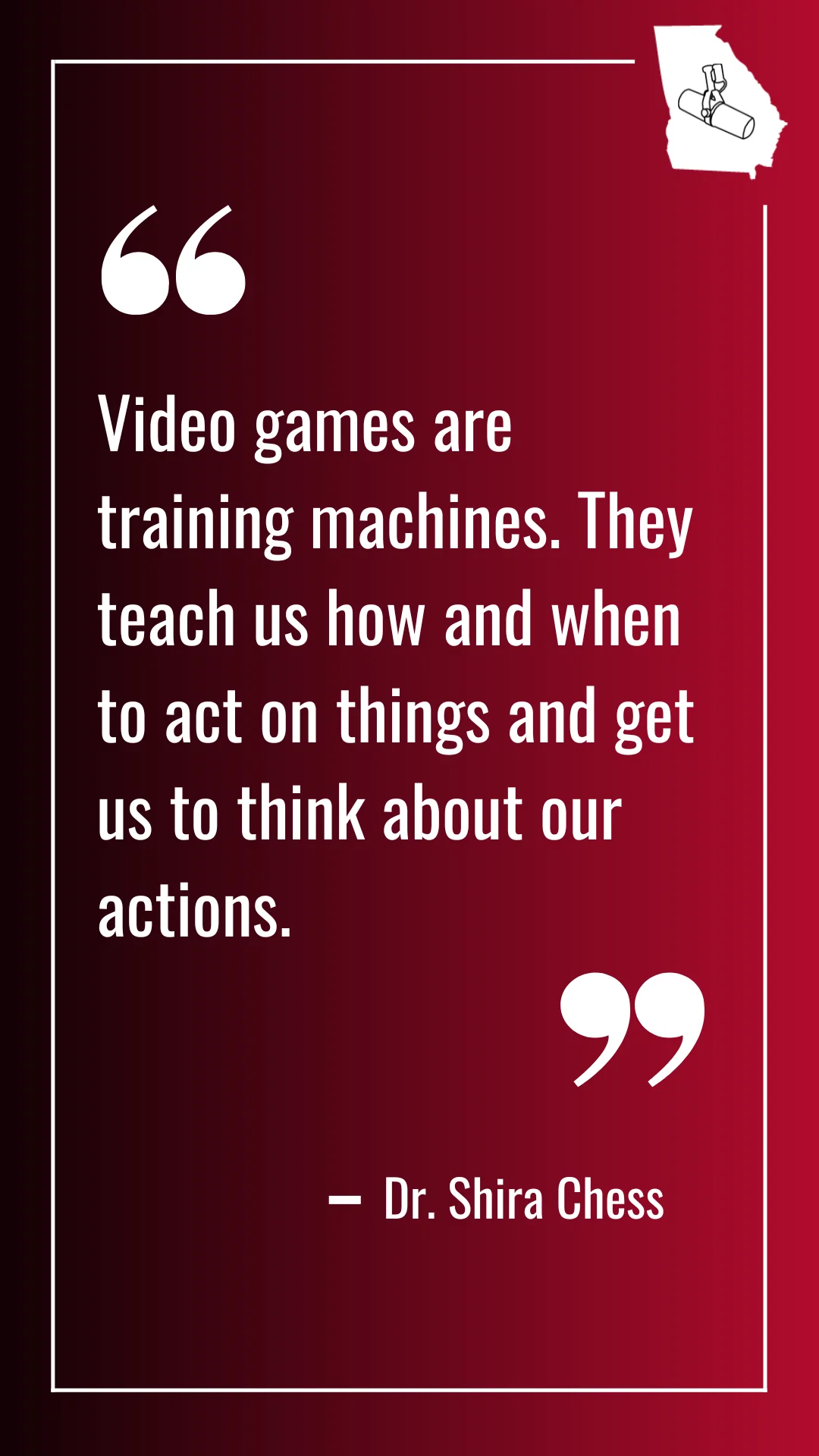Podcast: The future of video game studies with Dr. Shira Chess

Podcast: The future of video game studies with Dr. Shira Chess
Listen to Grady Research Radio
Apple Podcasts/Spotify/Stitcher
The Grady Research Radio podcast recently had the pleasure of sitting down with Dr. Shira Chess, an associate professor in the Department of Entertainment and Media Studies at Grady College, a game studies researcher, and the author of books including “Play Like a Feminist” and “Ready Player Two: Women Gamers and Designed Identity.”
Over the summer, Dr. Chess published an introduction for an article in the journal Critical Studies in Media Communication titled “The future of media studies is game studies,” which shines a light on the significance of video games in the broader field of communication studies.
In the episode, Dr. Chess discusses her writing, why video games may not get the attention they deserve, and what the future may hold.
Below is a transcription of the episode, edited for clarity and brevity.

Grady Research Radio: What is game studies?
Shira Chess: A lot of scholars out there are studying video games and have been for a while now. It’s been an emerging field since around the late 1990s, when games stopped being considered toys and started really increasingly being considered media objects.
Grady Research Radio: You recently published an article titled “The future of media is game studies.” Can you explain what that article is, just a brief overview?
Shira Chess: It was an introduction to a special issue. So, to back up a little bit, one of my academic heroes, Mia Consalvo, and I were talking about something we could work on together during the pandemic. And, you know, things were pretty glum during the pandemic, in general, for a lot of people. We were trying to think of a project that would really get us excited about what it was that we did again.
The idea of the special issue wasn’t just about one specific topic in game studies, but was highlighting the potential in the future and looking to younger scholars and junior scholars to see where they see the field emerging. So, the article that I wrote was largely an introduction to that special issue.
We did sort of have this provocation as the premise, you know, that the future of media studies is game studies. A big reason for that is, what happens in academic conferences a lot of times is that everybody kind of stays in their silos. You go to an academic conference or you read journal articles and you tend to stay in your little silos of what you’ve been studying and what everybody around you has been studying. And you sort of continually look at the same things over and over again.
I’m making some broad generalizations. There are certainly academics who do not do that. But, at conferences, for instance, a lot of times what happens is you don’t end up seeing the scholarship and the changes in a specific subfield because you just haven’t been paying attention.
So, we sort of started teasing out this idea — media studies folks could really learn a lot by stopping and looking at game studies, even if they’re not somebody who studies video games specifically or plays video games. And that is sort of a reflection of a larger problem, something that I’ve studied a lot, which is how people tend to be very dismissive of video games, you know, treat them like they’re a toy and like there’s no content there to study. Really, they are rich with content. They are overflowing with content.
Part of my career has been trying to talk to people about video games, why they should reconsider them, and why we need to expand the market of video games. This article was very much trying to do the same thing within media studies, trying to convince people who are media studies scholars and maybe study television or film or other areas and say, “But wait, maybe you should look at some game study scholarship, some emerging scholars, and take a look at some things they’re doing, because you might be surprised.”
Grady Research Radio: So, why do you think there is this resistance to accepting game studies, or even video games in general, as a viable source of media and not just a game?
Shira Chess: I mean, I think it’s changing. I think, in terms of resisting game studies, it’s just as I said. I don’t know that a lot of scholars are like, “ugh, game studies.” It’s more like, “That’s not for me.”
But the problem is, with the way corporate conglomeration works and with the way that transmedia storytelling works, we all are studying digital games to some extent. Everything has gotten a little bit more fuzzy. That does matter, in the same way that television matters in a different way than it did a decade ago, with the advent of streaming services, right? Television is different than what it was. Video games are different from what they were.
In terms of why people are dismissive of video games — I started off by saying scholarship on games and violence, or scholarship on games and addiction, looking at those sort of salacious things creates a low-level moral panic sometimes. But the reality is that video games are a medium still figuring themselves out, and we’re only really just now starting to see what they are and what they can become.
Grady Research Radio: Absolutely. I don’t want to ask you to speculate too much, but what do video games have to offer that the general public may not necessarily see?

This is not my specific area, but I know a lot of good scholars, such as Aubrey Anable and Katherine Isbister, have written about games and affect. Video games are particularly well situated to get us thinking about the emotions of others and put our subject in somebody else’s body. That’s pretty cool, right? It is in a way that films and television sometimes can do, but that reliance on action puts us in a place where we might empathize differently with different subject positions.
One thing that I’ve written about a bit is video games and agency, or will to act. Video games are training machines. They teach us how and when to act on things and get us to think about our actions.
And then, in general, there are some video games out there that are just aesthetically beautiful. In the same way that books and film and television are beautiful, there are beautiful video games out there.
I am certainly not saying that somebody should dump all of the other media in their lives and replace it all out with video games. That would be ridiculous. But I do think that there are opportunities to play games in ways that will give us moving experiences similar to other forms of media.
Grady Research Radio: Great. So back to the article. You did touch on a lot of this already, but can you go back and explain your argument, the purpose of this article and where it’s all going?
Shira Chess: The argument was basically, “Hey, look over here.” It’s not deep. It wasn’t meant to be deep. It was more like, you know, we’ve gathered together some young junior scholars that do have some interesting arguments, and we think that you should read them.
We specifically asked the scholars to write things that were on the shorter side, to make it a little bit more accessible, to make it a smattering of a lot of ideas, rather than a couple of big thoughts.
Basically, when we approached people, we were like, “What do you think is the future of game studies?” And everybody kind of took that assignment a little bit differently and responded to it in different ways. So, all of these people, collectively, created this tapestry of different ideas and thoughts, which was really what we were looking to do in the first place.
Grady Research Radio: This might be kind of a two-part question. Game studies is a relatively new thing. Video games are relatively new. But, do you believe that it has been on an upward trajectory in terms of people accepting it as a valid form of media? Do you foresee this article, this whole idea, having a positive impact on game studies?
Shira Chess: I think that, in general, people are taking video games more seriously than they have. But I think that’s with a caveat, right?
I think that there are more people playing video games than ever before, because mobile devices make games more accessible. You are hard-pressed to find a person who doesn’t play any kind of digital game, whether that is a console-based game, whether that is Candy Crush Saga, or whether that’s Wordle, right? Once you start expanding your definition of what a digital game is, you realize we should all be in on this conversation about what they can look like and what they can be.
I think, though, that at the same time, it’s brought in new layers of anxieties. For a long time, people would come to me, you know, both inside and outside of academia, and they would say, “Oh you study video games. They’re so violent.” Or somebody would write a journal article talking about violent video games. And my first answer would always be, “Which video games?” Because, you know, I spent a large portion of my career studying Diner Dash and Kim Kardashian Hollywood. Other than some aesthetic violence in Kim Kardashian Hollywood, I would say that that’s not a very violent game, right?
But the problem is, the industry and audiences often centralize the games that are violent, or the games that are big console games. We’re starting to see that breakdown a little bit. And with that comes a lot of anxieties within the industry, because the industry itself goes through phases of free fall, and there have been problems over the last couple of decades. But, at the same time, I would say that some of the anxieties about video games and violence have been replaced with anxieties by video games and addiction.
And that’s not to say that those things aren’t real or not worth talking about. But this medium is still figuring itself out. And by ignoring the product, we don’t get to shape the medium.
Grady Research Radio: Thank you for joining us today.
Shira Chess: Thank you very much for having me here.